27 search results - page 2 / 6 » Linear Time Byzantine Self-Stabilizing Clock Synchronization |
SSS
2005
Springer
13 years 10 months ago
2005
Springer
Awareness of the need for robustness in distributed systems increases as distributed systems become integral parts of day-to-day systems. Self-stabilizing while tolerating ongoing ...
EDCC
1999
Springer
13 years 9 months ago
1999
Springer
In this paper we present a new fault tolerant clock synchronization algorithm called the Fault Tolerant Daisy Chain algorithm. It is intended for internal clock synchronization of...
OPODIS
2004
13 years 6 months ago
2004
S (in alphabetic order by speaker surname) Speaker: Uri Abraham (Ben-Gurion University) Title: Self-Stabilizing TimeStamps : Speaker: Anish Arora (Ohio State) Title: Self-Stabilizi...
PODC
2012
ACM
11 years 7 months ago
2012
ACM
The goal of Byzantine Broadcast (BB) is to allow a set of fault-free nodes to agree on information that a source node wants to broadcast to them, in the presence of Byzantine faul...
INFOCOM
2002
IEEE
13 years 9 months ago
2002
IEEE
Abstract—Packet delay traces are important measurements for analyzing end-to-end performance and for designing traffic control algorithms in computer networks. Due to the fact t...


